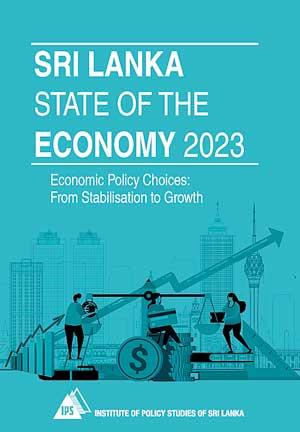Reply To:
Name - Reply Comment
The Institute of Policy Studies of Sri Lanka will launch its flagship report titled ‘Sri Lanka: State of the Economy 2023’ today (October 17).
2023’ today (October 17).
Centered on the theme ‘Economic Policy Choices: From Stabilisation to Growth’ the report offers a critical assessment of the complex policy choices Sri Lanka faces as it navigates the path to economic recovery.
The report delves into Sri Lanka’s economic outlook and development prospects, considering both domestic and external policy conditions. Given the gradual progress in stabilisation and recovery efforts, the report focuses on policy choices and debates in key reform areas, including fiscal policy, trade, labour and land markets, education and health financing, migration, social protection, and sustainable energy development.
In this report, IPS researchers examine the policy path to stabilisation and strengthened macroeconomic fundamentals and discuss the impacts of global economic developments on Sri Lanka’s external sector in supporting the country’s post-default economic prospects.
One of the observations made in its chapter on ‘Decent Jobs and Sri Lanka’s Labour Market Conditions’ is that poverty levels in Sri Lanka are estimated to have more than doubled from 11.3% in 2019 to 15% by 2022. With the economic meltdown, jobs in the service and manufacturing sectors declined, pushing more and more people into lower-paying jobs in the agriculture sector. The economic downturn has adversely affected not only poverty but also inequality. Transitioning to a knowledge-based economy necessitates a substantial number of skilled workers and ample job opportunities to ensure their productive employment. Unfortunately, Sri Lanka faces a challenge with its relatively low skill levels. One of the suggestions made by Dr. Nisha Arunatilake, Director of Research at IPS is that policies must be in place to improve access to productive jobs and social security to not only bring households out of poverty but also to ensure sustained growth and economic stability.
The importance of establishing efficient and integrated social protection systems has been a key area of interest following the COVID-19 pandemic. Sri Lanka’s economy experienced multiple shocks along with the COVID-19 pandemic which increased the cost of living and increased poverty levels as mentioned before. An integrated social protection system can cater to the needs of all population segments. The chapter on this topic sheds light on local initiatives such as ‘Aswesuma’, reforms to the Samurdhi programme and many other initiatives which are still in their initial stages alongside recommendations to successfully implement these reforms. In her comments based on her research, IPS Research Fellow Dr Ganga Tilakaratna said that having a fixed-term scheme would help prevent social welfare beneficiaries from treating government cash transfers as ’lifetime benefits’ or ‘entitlements.’
The report also explores the need to reform land policies for economic development while giving more emphasis on the scarcity of land which correlates with population growth and lack of clear titles thereby causing the fragmentation of land. This chapter discusses how Sri Lanka’s land policies and institutional setup have led to inefficient land use and compromised the well-being of the land users. The research for this chapter was conducted by IPS Research Fellow Dr. Manoj Thibbotuwawa who stressed the rapid scarcity of land. “On top of this, Sri Lanka cannot allocate land for other economic uses sustainably unless a rational policy is devised to improve the efficiency of existing land uses and to balance the growing demand between agriculture and land for industry, infrastructure, residential sectors, etc,” he added.
According to IPS’ Executive Director Dr Dushni Weerakoon, having entered its 17th IMF programme in the worst shape imaginable, Sri Lanka will no doubt leave the programme in somewhat better shape on the macroeconomic stabilisation front. However, macroeconomic stabilisation alone does not mean that an equally pertinent economic problem has been resolved – quality GDP growth that produces good quality jobs to make Sri Lankans hopeful of their future. It would require making some difficult choices to tackle growth-constraining policy obstacles while guarding against widening income gaps, popular anger and social unrest. These issues are examined in detail in the report.
Other chapters of the report include reforms for export-led growth, balancing brain-drain and immigrant workers for resilience and recovery, improving equity and quality in education, building a resilient health system and policy options to drive Sri Lanka’s renewable energy sector. Each one of these chapters has been compiled by a team of experienced economics researchers who excel in diverse fields.
The IPS report is available for sale at IPS, No. 100/20, Independence Avenue, Colombo 7 and at leading bookshops island-wide.